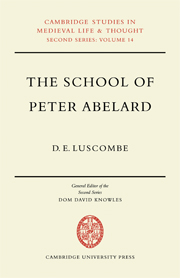Book contents
- Frontmatter
- Contents
- Preface
- List of Abbreviations
- I The Literary Evidence
- II Abelard's Followers
- III The Diffusion of Abelardian Writings
- IV The Condemnation of 1140
- V The Theological Writings of Abelard's Closest Disciples
- VI The School of Laon
- VII Hugh of St Victor
- VIII The Summa Sententiarum
- IX Abelard and the Decretum of Gratian
- X Abelard's Disciples and the School of St Victor
- XI Peter Lombard
- XII Robert of Melun
- XIII Richard of St Victor
- XIV Conclusion
- Appendices
- Bibliography
- Index of Manuscripts
- General Index
VI - The School of Laon
Published online by Cambridge University Press: 05 November 2011
- Frontmatter
- Contents
- Preface
- List of Abbreviations
- I The Literary Evidence
- II Abelard's Followers
- III The Diffusion of Abelardian Writings
- IV The Condemnation of 1140
- V The Theological Writings of Abelard's Closest Disciples
- VI The School of Laon
- VII Hugh of St Victor
- VIII The Summa Sententiarum
- IX Abelard and the Decretum of Gratian
- X Abelard's Disciples and the School of St Victor
- XI Peter Lombard
- XII Robert of Melun
- XIII Richard of St Victor
- XIV Conclusion
- Appendices
- Bibliography
- Index of Manuscripts
- General Index
Summary
In the lifetime of Anselm (d. 1117) the cathedral school of Laon was without a peer as a centre of theological instruction. In 1113 Abelard, already a celebrated teacher of dialectic and past his thirtieth year, himself went to Laon to learn theology under Anselm. He found that Anselm was revered by his hearers and had a considerable verbal facility, but he thought that in his lectures Anselm did not say anything which could not be as well learned from books. The surviving productions from the school of Laon support Abelard's criticisms in the sense that the school was characterized by a great, even extreme, fidelity to patristic teaching and to the text of the sacred page and also in the sense that the more speculative areas of Christian theology, such as the Trinity and the person of Christ, were largely bypassed in favour of more practical subjects, such as the evaluation of moral experience and the sacraments, and of historical-biblical subjects such as the creation, the fall and the redemption. From the doctrinal viewpoint the school in general made little progress, although in relation to the organization of studies in the twelfth century the school was of very great importance. It was the first theological school since the great days of Bec which could boast a high reputation and a large following and, unlike Bec, it was a school of clerics. Anselm and his brother Ralph and their followers fostered the production of the Glossa on the Bible and they stimulated the systematic arrangement of theological sentence-collections which lay at the base of the theological movement of the twelfth, even of the thirteenth, centuries.
- Type
- Chapter
- Information
- The School of Peter AbelardThe Influence of Abelard's Thought in the Early Scholastic Period, pp. 173 - 182Publisher: Cambridge University PressPrint publication year: 1969

